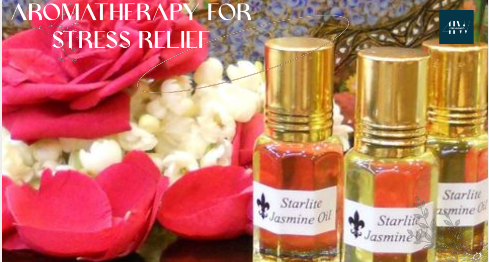In today's fast-paced world, stress has become an everyday companion for many of us. The constant demands of work, personal life, and other responsibilities can affect our mental and physical well-being. Fortunately, there are natural methods available to alleviate stress and promote relaxation. Aromatherapy, with its use of essential oils, has gained popularity as an effective technique for stress relief. In this article, we will explore the benefits of aromatherapy and how it can help you achieve a peaceful state of mind.
Aromatherapy is a holistic practice that utilises the therapeutic properties of essential oils extracted from plants. We can inhale these oils, apply them topically, or use them in diffusers. The powerful scents of essential oils stimulate our oil factory system, which is closely linked to the brain's limbic system, which is responsible for emotions and memories. By inhaling essential oils, we can positively influence our mood, reduce stress, and promote relaxation.
- Lavender:
Lavender is widely regarded as the go-to essential oil for stress relief. Its calming and soothing properties make it an excellent choice for promoting relaxation and improving sleep quality. Studies show that inhaling lavender essential oil can reduce anxiety levels and induce a sense of tranquillity.
- Chamomile:
Chamomile essential oil is well-known for its calming effects on the mind and body. It helps alleviate stress, anxiety, and insomnia, making it an ideal choice for those seeking relaxation. A cup of chamomile tea infused with a few drops of essential oil can provide a double dose of soothing goodness.
3. Bergamot:
Bergamot essential oil is derived from the peel of the bergamot fruit. Its citrusy aroma uplifts the mood and helps relieve anxiety and depression. We can use Bergamot oil in a diffuser, add it to bathwater, or apply it topically (diluted with carrier oil) for a calming massage.
4. Peppermint:
Peppermint oil has a cooling effect and is commonly used to alleviate headaches, improve focus and concentration, ease digestion, and relieve muscle pain.
5. Eucalyptus:
With its refreshing scent, eucalyptus oil is excellent for respiratory health. It can help relieve congestion, ease breathing, and relieve colds and sinus infections.
4. Tea Tree:
Tea tree oil has antibacterial and antifungal properties, making it helpful in treating acne, skin infections, and dandruff. It can also be used as a natural insect repellent.
5. Lemon:
Lemon oil has an uplifting and energising fragrance. It can help improve mood, reduce stress and anxiety, support immune function, and promote detoxification.
6. Rosemary:
Rosemary oil is often used for its stimulating and invigorating properties. It can improve focus and memory, boost circulation, relieve muscle pain, and promote hair growth.
7. Frankincense:
Frankincense oil has a grounding and spiritual aroma. It can help reduce stress and anxiety, promote relaxation, support immune function, and enhance meditation practices.
8. Ylang-Ylang:
Ylang-ylang oil has a sweet and floral fragrance that can help reduce stress, balance emotions, promote relaxation, and enhance mood.
. 1. Inhalation:
Inhaling essential oils directly or using a diffuser is one of the easiest ways to experience their benefits. You can add a few drops of your preferred essential oil to a diffuser, inhale the scent directly from the bottle, or use a personal inhaler.
2. Massage:
Aromatherapy massage combines touch's healing power with essential oils' therapeutic properties. Mixing a few drops of essential oil with a carrier oil like coconut or jojoba oil and massaging it onto your skin can help release tension, reduce stress, and promote relaxation.
3. Bathing:
Adding a few drops of essential oil to a warm bath is a great way to unwind and de-stress. The warm water enhances the absorption of fats into the skin, while the aromatic steam soothes the senses.
It's important to note that essential oils should be used with caution and proper dilution. Some individuals may have allergies or sensitivities to certain oils, so it's advisable to perform a patch test before using them extensively. Additionally, it's recommended to consult a healthcare professional or aroma therapist for personalised guidance and advice before use.

